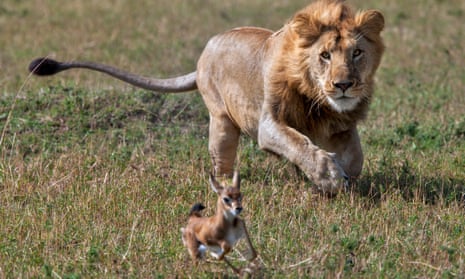Animal Planet
Less guilty, though not innocent,
In this universe where
The laws of nature decide
Who should kill whom
And whoever kills most is king.
How admiringly they film
The placid and ferocious lion as it tears a fawn to pieces!
And whenever I close my eyes or switch off the telly,
I feel that I participate less in the crime,
Even though the candle of life
Will always need blood to go on burning –
The blood of another.
Less guilty, though not innocent,
I sat at a table with the hunters,
Nevertheless, I loved to caress the long and silky
Ears of the hares
Lying in stacks, like a tumulus
On top of an embroidered tablecloth.
Guilty, even though I didn’t
Pull the trigger,
And I covered my ears
Horrified by the sound of death
And by the smell of the shameless sweat of the hunters who fired the shots.
Less guilty, though not innocent,
In any case more innocent than you,
The author of this pitiless perfection,
Who set up this design
And afterwards, taught me to turn the other cheek.
Translated by Paul Scott Derrick and Viorica Patea
- From My Native Land A4 by Ana Blandiana, translated by Viorica Patea and Paul Scott Derrick (Bloodaxe Books, 2014)
A number of poems in Ana Blandiana’s most recent Bloodaxe collection might be thought of as “anti-prayers”. The poetry of religious scepticism to which this work belongs is part of the wider tradition of sacred poetry, and it has strangely similar responsibilities. One is to clear a space for metaphor to flourish and overrun the dogma. Another, close to Blandiana’s poetics, is to make room for silence. “Philosophical poetry does not consist in pronouncing wise phrases,” she writes in her closing essay Poetry Between Silence and Sin, “but in expressing the silence that embraces words.”
Blandiana was born in Romania in 1942. Her personal experience of repression seems to have begun with the imprisonment of her father, an Orthodox priest. It may seem a step away from a poetry that challenges the authoritarian state to one challenging authoritarian Christian theology, but the angle is strikingly different. The political poet has to be simultaneously honest and devious. The poet protesting against God, if a believer, can challenge God openly: she is free to speak her mind, and, technically as well as psychologically, to be freed by that.
Animal Planet doesn’t sound like a prayer at first. It begins with a meditation about the self: the speaker’s own and, implicitly, every human’s. The antithesis of guilt/innocence is unpicked, though the basic duality is left intact. That reiterated phrase of conscience-raking self-analysis, “less guilty but not innocent”, suggests the moral crucifixion of the human animal. And the poem’s overall argument arises from a logical incompatibility in the muddled founding texts of Judeo-Christianity. Christ’s rule of pacifism, summarised in the last line’s quotation, “turn the other cheek”, is superimposed on the brutal realities of the Father’s creation, represented in stanza one by the wildlife film-maker’s favourite sequence. The narrative still obtains for many post-Darwin believers: God is present as first cause and then decently non-interventionist. The Redeemer’s advice is good but impossible. The poem seems to end with the submerged thud of a fist on the turned cheek.
Importantly, the focus swerves in stanza two to more ambiguous critical territory, the human pleasure derived from following a survival instinct when survival is not at stake. Using, as a kind of bridge, the interestingly mixed metaphor that closes stanza one, in which blood allows “the candle of life” to keep burning, the poem shifts to dreamlike, almost magical realist territory.
Now the speaker remembers sitting at table among a band of hunters, sensuously delighted by “the long and silky / Ears of the hares / Lying in stacks, like a tumulus / On top of an embroidered tablecloth”. The fruits of the hunt, so aestheticised, also suggest imperial theft, culturally constructed as the home delivery of beautiful objects to an “innocent” wife or mother by the male aggressor. It seems significant that, while the speaker stops her ears so she can’t hear the remembered gunshot, she clearly has no power to shut out the smell of the hunter’s “shameless” sweat. Though deemed horrifying, it can’t be so easily excluded, and, as a substance, sweat is clearly guiltless. Perhaps it exerts a subliminal attraction?
In English, the poem’s syntax is sometimes floaty, again suggesting a feminised aesthetic. The first sentence lacks a main clause and the last stanza omits the expected subject, “I”. This resembles stream-of-consciousness technique, and may also signal a deliberate dispersal of personal responsibility. The diction chosen by the translators is simple and colloquial – very colloquial when it comes to their choice of “telly” for television. Metaphors are unexceptional. There are “the laws of nature”, the lion that “tears a fawn to pieces”. The domestication of tone in the first stanza suggests anger, but a low-voiced, intimate anger, as it might be voiced by one woman to another across the kitchen table.
The last stanza begins like the previous two. But now the unexpected happens. The second person in the room is addressed directly. That “you” seems unambiguous, as it’s followed by the characterisation of “the author of this pitiless perfection”. An accusing finger is pointed, a harsh judgment delivered, to a God who is no longer the supreme being – perhaps no more than an equal. At the same time, the theological conundrum remains. The paradox is stated, not trashed. Animal Planet allows imaginative possibility (it’s still only a guess, after all, that this “you” is God) and it remains open to the possibility of faith. The unknowable is intact – and silent.

Comments (…)
Sign in or create your Guardian account to join the discussion